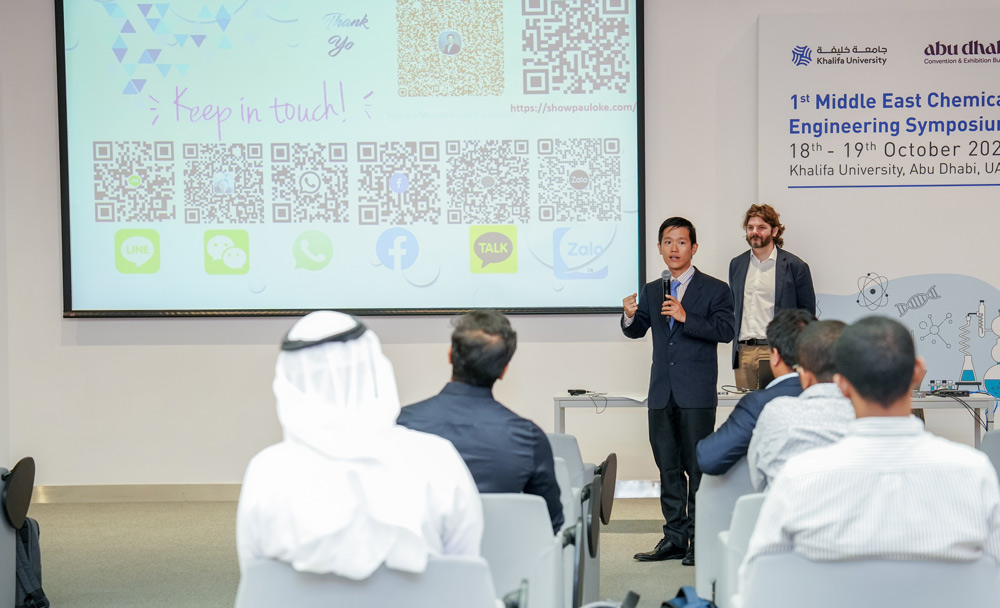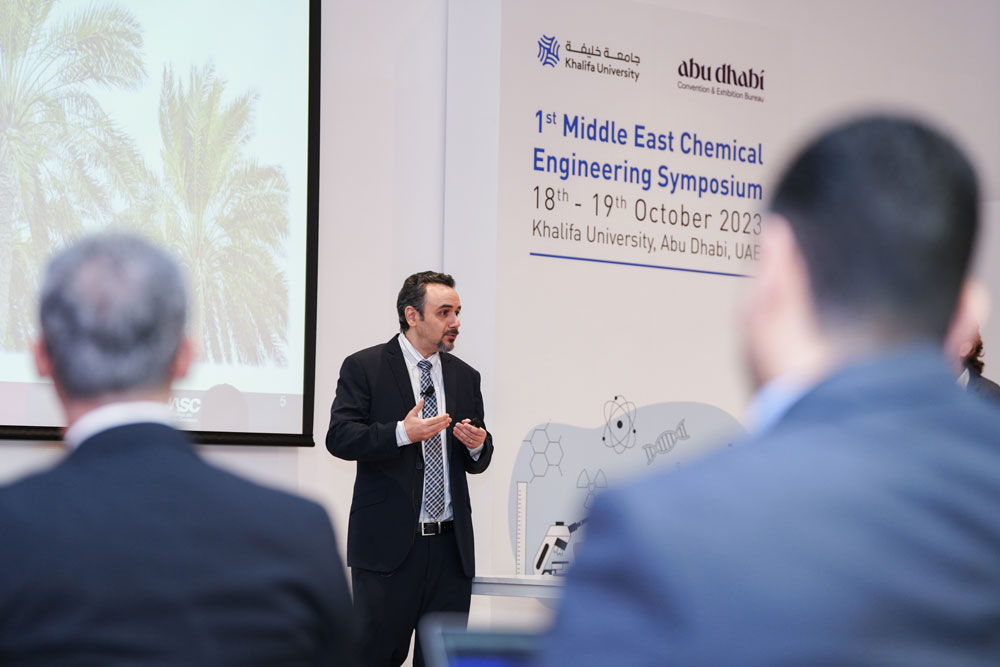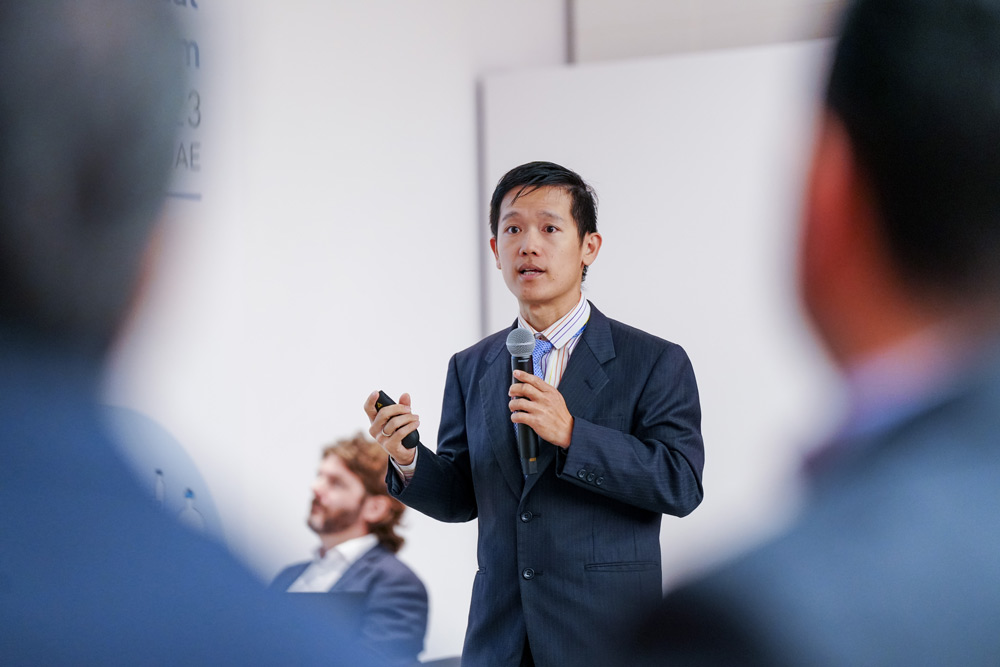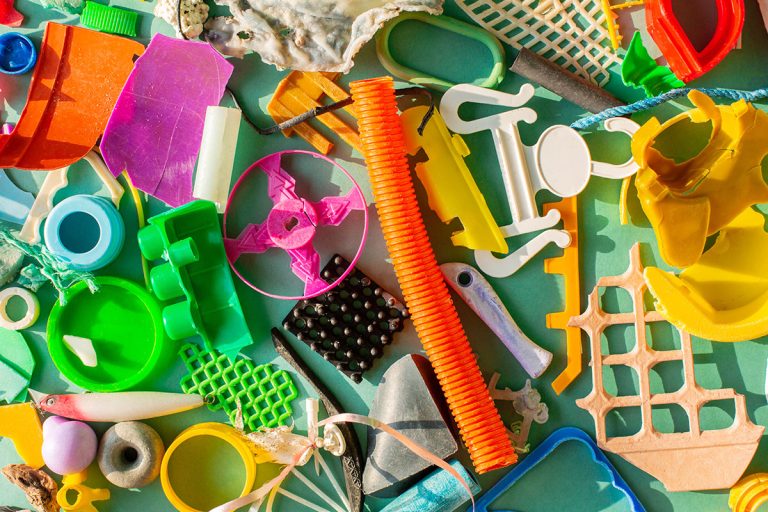Sustainable solutions for expanding Middle East cities and economies
The First Middle East Chemical Engineering Symposium brought together scientists and researchers to collaborate on water, environmental engineering and emerging energies that could inform future sustainable practices.
Khalifa University is poised to become the epicenter of transformative discussions and solutions addressing pressing regional challenges. As the host of the first Middle East Chemical Engineering Symposium (MEChES 2023), the university is taking the lead in convening experts and innovators to tackle critical issues such as water generation strategies and management, carbon capture and use, as well as emerging energy technologies, among other issues.
The Middle East is a fast-growing region. “This growth, concomitant with economic boom, is turbocharging the advancement in the areas of oil and gas, petrochemical, renewable energy, food, water management,” say the conference organizers. “MEChES 2023 aims to provide an academic discourse for the dissemination of latest research findings to promote collaboration. Specifically, the major focuses of MEChES 2023 encompass food, energy, and water nexus, which have become priority areas of policymakers, industry players and researchers.”
Pau-Loke Show and Sulaiman Al-Zuhair both gave talks about their groundbreaking work on microalgae cultivation and ways in which the Internet of Things is driving the industrial revolution in microalgae technology.
A single solution for microalgae biorefining
Professor of Biochemical Engineering at Khalifa University Pau-Loke Show discusses a revolutionary single-vat process for cultivating microalgae and recovering bio-products for industrial and commercial uses.
Commonly known as spirulina, microalgae have vast potential as a fast-growing food and nutrient resource as well as a source of valuable bioproducts such as oils, biofuel and industrial feedstock. Although easy to cultivate in large vats, harvesting and refining spirulina generally involve a series of processes outside of the growing vat; increasing the cost and complexity of production.
Under the guidance of Pau-Loke Show, a research and development team at Khalifa University has successfully completed the world-first pilot of an all-liquid, single-vat, cultivation-to-extraction process, streamlining the complex operations involved in microalgae production.

“Microalgae has become a very important and sustainable source of protein and nutrients that can be used not just in health supplements and food, but also as fertilizers and in many chemical industries,” says Show, who gave a keynote address on the potential of the revolution in microalgae production. While at the University of Nottingham Malaysia in 2022, Show helped establish the world’s first Algae Biotechnology Consortium, and through that completed the development of a liquid biphasic system (LBS) which combines the upstream cultivation and downstream processing.
The industrial cultivation of microalgae is well established. With the right combination of nutrients, pH and temperature as well as sufficient sunlight, microalgae can be grown continuously, maximizing biomass production. To capture the useful products from the same solution, Show’s team developed a bubbling method. It involved injecting another solution that collects the bioproducts and brings them to the surface for extraction.
“The challenge was in finding the right combination of aqueous solutions and then controlling the conditions precisely to achieve optimal yield and purity,” says Show. “We achieved this by harnessing the power of artificial intelligence and advanced digital imaging to monitor and fine-tune all of the process parameters in a way that maximizes both production and extraction.”
The consortium has constructed a pilot plant in Malaysia, which is the largest spirulina farm in the region. This facility is now operational as a full-scale practical demonstration of the technology producing spirulina for the Asian market. These achievements and the potential of the technology earned Show the Young Asian Biotechnologist Prize 2023 from the Society for Biotechnology Japan.
“With this success we want to expand the consortium so that we can spread this low-energy, carbon-consuming technology,” says Show. “MEChES has been a really important opportunity to discuss these technologies and create new collaborations that could lead to new and expanded applications in not just food and nutrient production but also bioremediation of waste and other uses that contribute to sustainability and a circular economy.”
Simplifying biofuel production to reduce costs
Professor of Chemical Engineering at UAE University Sulaiman Al-Zuhair explains how research on simpler and more efficient production of biofuel from microalgae and biomass could unlock this promising resource.
Biofuels represent a promising avenue to address the challenge of converting atmospheric carbon dioxide into a sustainable fuel source, while closing the carbon energy loop. In regions such as the Gulf, which have abundant sunlight but little arable land, algae stands out as a highly productive biomass source for large-scale biofuel production facilities. The extensive date palm plantations in the region also provide a significant source of lignocellulosic biomass waste. Unlocking the potential of both renewable resources, however, will require improvements to the production reliability, consistency and a simplification of the refining steps to lower production costs.
Sulaiman Al-Zuhair, a Professor of Chemical Engineering at UAE University, has been leading research into better biochemical processes to improve the efficiency of biofuel production from microalgae and lignocellulosic waste. “Microalgae can be cultivated using saline water without the need for arable land or freshwater, making it—along with date palm waste—an ideal biomass resource for our region,” says Al-Zuhair.

Despite the UAE’s decade-long history of biodiesel production, it has largely relied on a variable supply of waste vegetable oil feedstock. If microalgae or date palm biomass could be used efficiently for biofuel production, such facilities could be quickly scaled to provide a significant proportion of energy consumption.
In his keynote address at MEChES, Al-Zuhair discussed innovative ways to enhance the stability and reusability of enzymes in microalgae-to-biodiesel and lignocelluloses-to-bioethanol processes.
“In our research, we have shown that thermoresponsive switchable solvents can be used to simultaneously drive cell disruption, the oil extraction reaction and product separation from wet, untreated microalgae biomass in a single reactor,” says Al-Zuhair. “Using a single solvent in this way for oil extraction could greatly simplify biodiesel production from microalgae and avoid the energy-intensive drying and grinding steps of conventional extraction processes.”
Al-Zuhair’s work tackles the cost barrier associated with enzymes needed to convert biomass to biofuels. He has shown that enzymes can be used repeatedly for microalgae conversion in a continuous process by immobilizing the enzymes on soluble materials. Al-Zuhair also highlighted the potential of membrane bioreactors to enhance cellulose hydrolysis in bioethanol production from lignocellulosic biomass.
“MEChES 2023 is the first large gathering of chemical engineers in the UAE, and was a good platform for researchers to present and discuss their latest research findings,” says Al-Zuhair. “It shed light on the advancements in research in the UAE and the Middle East in general and created opportunities for collaboration between universities, research institutions and industry.”




